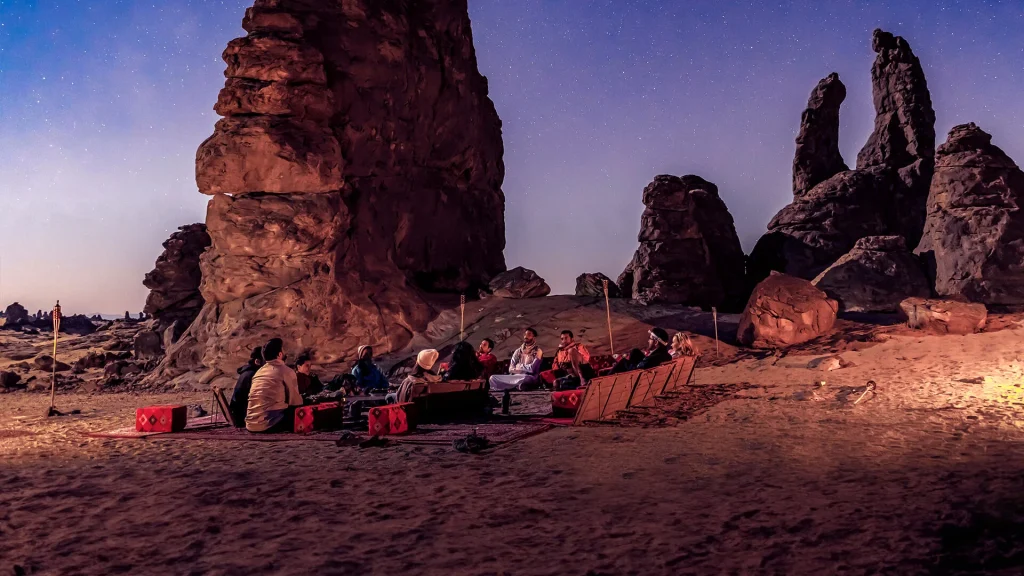Dubai’s desert isn’t just sand and silence—it’s a sky full of ancestral knowledge. For centuries, Arabic astronomers navigated using only the stars. These skies witnessed traders, poets, and scholars who memorized constellations long before GPS was born. Today, you can experience this legacy through Arabic astronomy heritage tours that combine storytelling, science, and Emirati hospitality in one unforgettable desert night. It’s a celestial encounter stitched into the culture of the UAE.
Al Thuraya Astronomy Center blends modern science with ancient insight
Tucked inside Mushrif Park, Al Thuraya Astronomy Center serves as a key hub for stargazing in Dubai. The center hosts educational programs that showcase the contributions of Arab scholars like Al-Battani and Al-Tusi. Visitors explore exhibits detailing ancient star charts, Islamic lunar calendars, and traditional tools like astrolabes. Equipped with high-powered telescopes, the center lets guests observe celestial bodies while learning how desert travelers once did the same using only the naked eye and intuition.
Dubai Astronomy Group hosts guided tours deep into the desert
The Dubai Astronomy Group organizes regular public sessions in Al Qudra or Al Marmoom, far from the city’s glow. These guided nights begin with an introduction to the Arabic star-naming system, followed by a telescope session under some of the clearest skies in the UAE. Some evenings include expert lectures on Arab contributions to mathematics and navigation. It’s not unusual for visitors to leave these nights feeling as if they’ve stepped into an ancient observatory powered by sand and silence.
Cultural desert safaris bring astronomy to life through heritage
Several safari operators now offer themed desert experiences combining astronomy and cultural tradition. After a drive over golden dunes, guests are welcomed with gahwa (Arabic coffee) and dates. As the stars rise, a local guide recounts how tribal communities once navigated vast lands using constellations like Suhayl and Al Thuraya. These sessions often feature poetry, oud music, or traditional tent setups that make you feel transported back in time. Astronomy becomes more than science—it becomes story.
Arabic star navigation sessions reveal a forgotten system of direction
In certain workshops, visitors learn how to identify direction using constellations known to early Arabs. Unlike modern compasses, Bedouins used the position of specific stars—such as Altair or Polaris—to track water routes, trade roads, and grazing grounds. Some tours recreate these methods, letting you track stars across a sky map and walk short paths in desert terrain. It’s a literal and symbolic way to retrace the steps of ancestors.

Workshops explain lunar-based Islamic calendars and timekeeping
Arabic astronomy played a foundational role in Islamic culture, particularly in setting prayer times and Hijri calendar months. Several tour experiences now include short lectures on how astronomers used lunar phases to determine the start of Ramadan, Eid, or even daily suhoor and iftar times. Guests see how instruments like the quadrant or sundial were used centuries ago, and how they’ve evolved into modern-day observatories like Al Thuraya.
Arabic astronomy tours often include storytelling passed down generations
What sets Dubai’s astronomy heritage tours apart is the emphasis on oral tradition. Guides often share tales once told by grandfathers sitting under the stars—tales of travelers lost and found, of stars as protectors, or omens of change. These stories, while not scientific in nature, enrich the experience with emotional and cultural depth. They remind us that long before universities, the desert itself was the classroom.
Stargazing events often support desert conservation efforts
Many of these tours are operated in protected zones like the Al Marmoom Desert Conservation Reserve. Organizers ensure minimal disruption to wildlife while educating guests about environmental sustainability. A portion of the proceeds often supports desert flora protection or educational programs for local schools. By attending an astronomy heritage tour, visitors not only learn—they contribute to the preservation of the natural landscape that made such astronomy possible.
You don’t need prior knowledge—just curiosity and a warm jacket
One of the most welcoming aspects of these tours is their accessibility. No prior astronomy knowledge is needed. Sessions are designed to accommodate families, solo travelers, and school groups alike. The only real preparation required is to dress warmly—the desert gets surprisingly cool after sunset. Some programs even provide traditional cloaks or blankets, adding to the cozy, immersive experience. All that’s left is to listen, learn, and look up.
In Dubai, Arabic astronomy is not just preserved—it’s experienced
From the quiet of the desert to the domes of the city’s observatories, Dubai offers something rare: the chance to feel astronomy, not just study it. These heritage tours combine science and spirit, data and myth, present and past. Whether you come for the stars or the stories, what you’ll find is connection—to culture, to cosmos, and to something timeless that shines just above the dunes.
This guide was created by the editorial team at www.few.ae.
